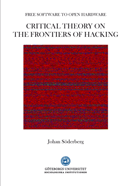Johan Söderberg: Free Software to Open Hardware: Critical Theory on the Frontiers of Hacking (2011)
Filed under thesis | Tags: · critical theory, critique, floss, free software, hacking, hardware, open hardware, software, technology

Starting from the experiences of hackers developing free software and open hardware, this thesis addresses some key and recurrent themes in the field of Science and Technology Studies (STS). It poses the question: how are technologies conceptualised, constructed and used in ways that render some aspects of them transparent, while leaving others opaque? This question is complicated by the fact that what is visible and transparent to some will remain opaque to others, depending on the level of technical expertise commanded. The political implications of this stand at the heart of my inquiry. Since technical know-how is unevenly distributed among groups in society, the same concern can be rephrased as follows: How are relations of power and conflict mediated through technology and relations of technical expertise/ignorance? While trying to address this question, the thesis delves into matters of epistemology. Just as programming skills are required for seeing what is going on behind the computer screen, so theoretically informed reflection can be considered necessary for rendering visible social relations not immediately apparent to the casual eye. Discussion of the actions of hackers is therefore combined in this thesis with discussion of the alternative programmes of research which can be applied to the study of these actions. Two programmes of research in particular receive attention: the critical theory of technology and constructivist science and technology studies (STS). Of these two, the relevance of the former tradition is emphasized and its value for research in the STS field defended. The thesis is composed of four articles and an introductory chapter summarizing and encapsulating my concerns. The first article discusses belief in technological determinism among hackers and how this does not necessarily stand in opposition to political engagement. On the contrary, it is common within hacker politics for contending viewpoints to be articulated in relation to seemingly apolitical narratives about technical neutrality and progress. The second article also deals with antagonistic relations at the heart of processes of technological change. It argues that the punitive actions of law enforcement agencies provide a clear indication of the presence of asymmetrical power relations in technological change through, for example, attempts to suppress filesharing inventions. Hackers are negotiating with legal authorities and the mass media, but also amongst themselves, about how to draw the line between the legitimate users and harmful misusers of technology. The third and fourth articles are based on a case study of a group of Czech hardware hackers who invented a wireless network technology for sending data with visible, red light. The challenges faced by these hardware hackers in their attempts to design technical solutions capable of being built by non-expert users are discussed at length in a theoretically-informed fashion.
PhD thesis
University of Gothenburg, Department of Sociology, March 2011
ISSN: 1650-4437
ISBN: 978-91-975442-7-6
68 pages
Creative Commons: Attribution-ShareAlike
David Toews: The Social Occupations of Modernity: Philosophy and Social Theory in Durkheim, Tarde, Bergson and Deleuze (2001)
Filed under thesis | Tags: · criticism, modernity, ontology, philosophy, social ontology, social theory, society, sociology
“This thesis explores the relationship between occupations and the ontology of the social. I begin by drawing a distinction between the messianic and the modern as concentrated in the affective transformation of vocation into occupation. I then, in the Introduction, sketch an ontic-ontological contrast proper to the modern, between modernity, as the collective problematization of social diversity, and the contemporary, as the plural ground of need which provides a source for these problematizations. I argue that this distinction will enable me to shed new light on the occupational as a distinctly modern event.” (from Abstract)
PhD thesis
University of Warwick, Department of Philosophy, August 2001
Supervisors: Peter Wagner, Keith Ansell-Pearson
270 pages
Marc Stumpel: The Politics of Social Media. Facebook: Control and Resistance (2010)
Filed under thesis | Tags: · facebook, floss, open source, protocol, resistance, software, tactical media, web, web 2.0
This thesis examines the governance of contemporary social media and the potential of resistance. In particular, it sheds light on several cases in which Facebook has met with resistance in its attempt to exercise control. This social networking site has raised concerns over privacy, the constraints of its software, and the exploitation of user-generated content.
By critically analyzing the confrontations over these issues, this thesis aims to provide a framework for thinking about an emerging political field. This thesis argues that discursive processes and (counter)protocological implementations should be regarded as essential political factors in governing the user activities and conditions on large social networking sites.
A discourse analysis unveils how Facebook enacts a recurrent pattern of discursive framing and agenda-setting to support the immediate changes it makes to the platform. It shows how contestation leads to the reconfiguration and retraction of certain software implementations. Furthermore, a software study analyzes how the users are affected by Facebook’s reconfiguration of protocological assemblages. Several tactical media projects are examined in order to demonstrate the mutability of platform’s software.
Keywords: Facebook, Network-making power, Counterpower, Framing, Protocol, Tactical Media, Exploitation, Open-source, Agonistic Pluralism, Neodemocracy
Master thesis
Media Studies (New Media), University of Amsterdam
Supervisor: Dr Thomas Poell
Second reader: Dr Geert Lovink
Date: August 16, 2010
82 pages

